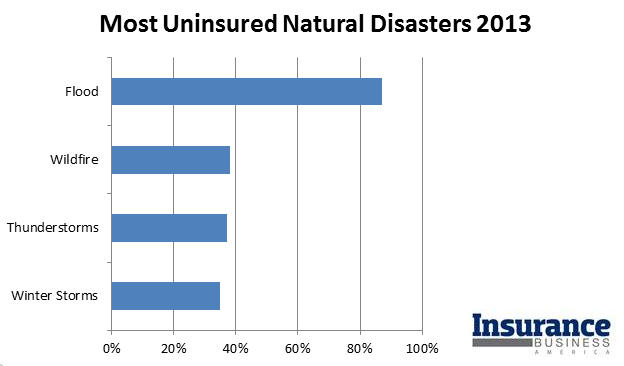The number of natural disasters in the United States has quintupled in the last 30 years, and while rates of insured losses have increased, there is still a lot of work to be done.
A recent report from global reinsurer
Munich Re and the Insurance Information Institute reveals that when it comes to some natural disasters, even an increase in catastrophic incidents can’t persuade a large portion of people to purchase the appropriate policies.
Losses from natural disasters were down in 2013, the Munich and III report shows, but overall losses still topped $21,800mn. While $12,794mn of that was insured, some natural disasters caught Americans completely unprepared.
Flood, wildfire, thunderstorms and winter storms all topped rates of more than 30% of losses uninsured. Flood led the way, with 87% of 2013 losses uncovered by some sort of policy. Much further down the line, 38% of wildfire-related losses were uninsured, along with 37% of thunderstorm losses and 35% of winter storm losses.

According to Carole Walker, director of the Rocky Mountain Insurance Information Association, the reason so many flood-related losses go uninsured is because flood insurance doesn’t come cheap—particularly in view of impending rate increases related to the 2012 Biggert-Waters Act.
“Flooding is our most common natural disaster that isn’t covered under a standard policy, but unfortunately, most people don’t carry insurance,” said Walker, whose native Colorado boasts just 22,000 flood insurance policyholders despite recent rainstorms. “Flooding takes many people by surprise, and most people just weigh the risk and decide to run with it.”
However, home and business owners who choose to ignore the lessons of events like the Colorado floods and Hurricane Sandy do so at their own peril. The III notes that 25% of businesses that close their doors after natural disasters never reopen them, and Walker said federal resources like FEMA won’t always be there to help.
“How do you recover from something when you don’t have insurance?” she said. “People assume that these large-scale disasters will always be followed by a federal emergency declaration that will help them out. That isn’t always the case.”
Producers need to ensure that their clients recognize the importance of flood insurance, even if they feel the odds are in their favor.
“The big message here is, yes…we do get flash floods,” Walker said. “It’s our most common natural disaster, and we really urge agents to offer flood insurance to everyone and everyone should consider purchasing it, weighing their risk.”
Flood insurance also impacts losses from thunderstorms and winter storms, the III noted.
You may also enjoy: "Are FEMA flood maps benefitting the rich?"
"'Absolutely heartbreaking' lack of coverage for Wash. landslide victims"
"Natural disasters go easy on US in 2013"


